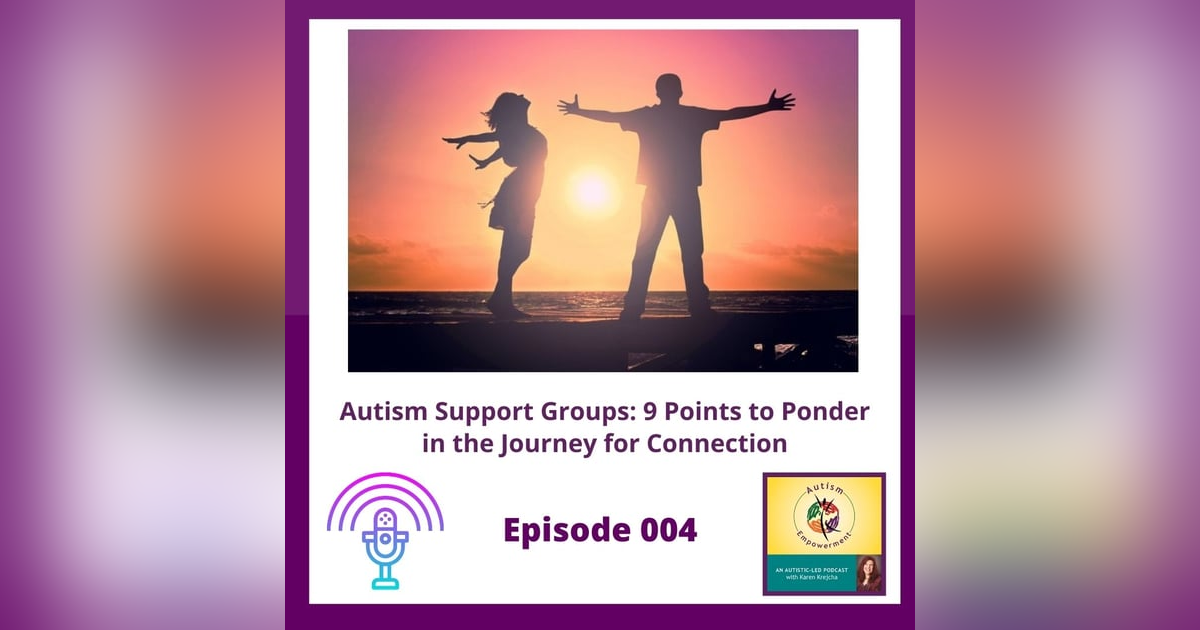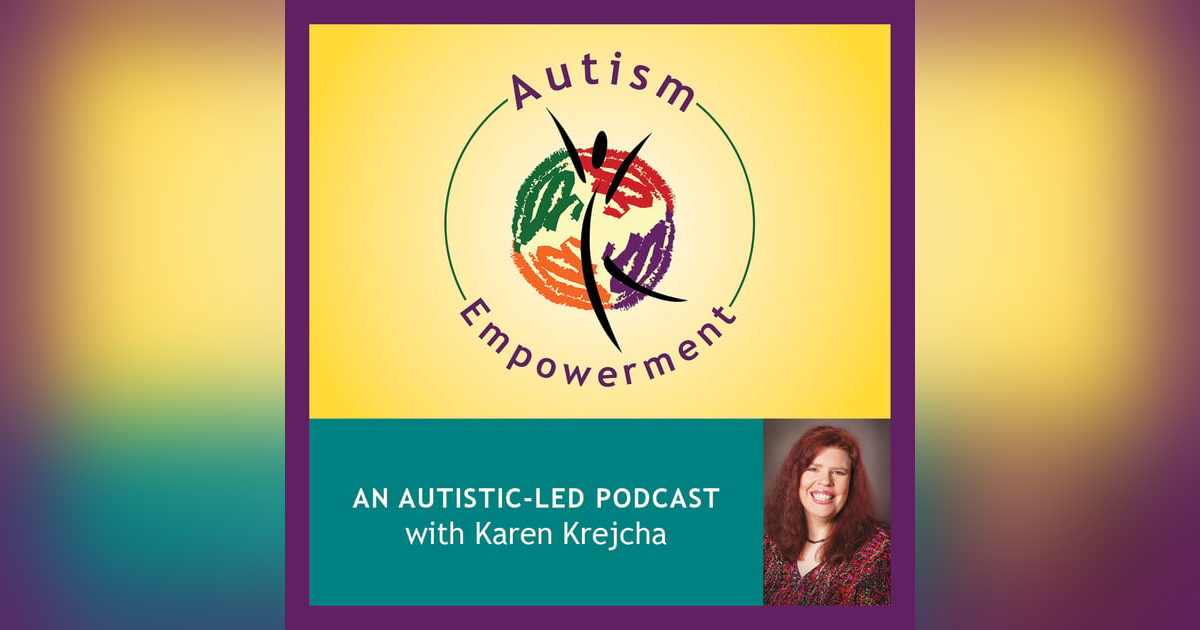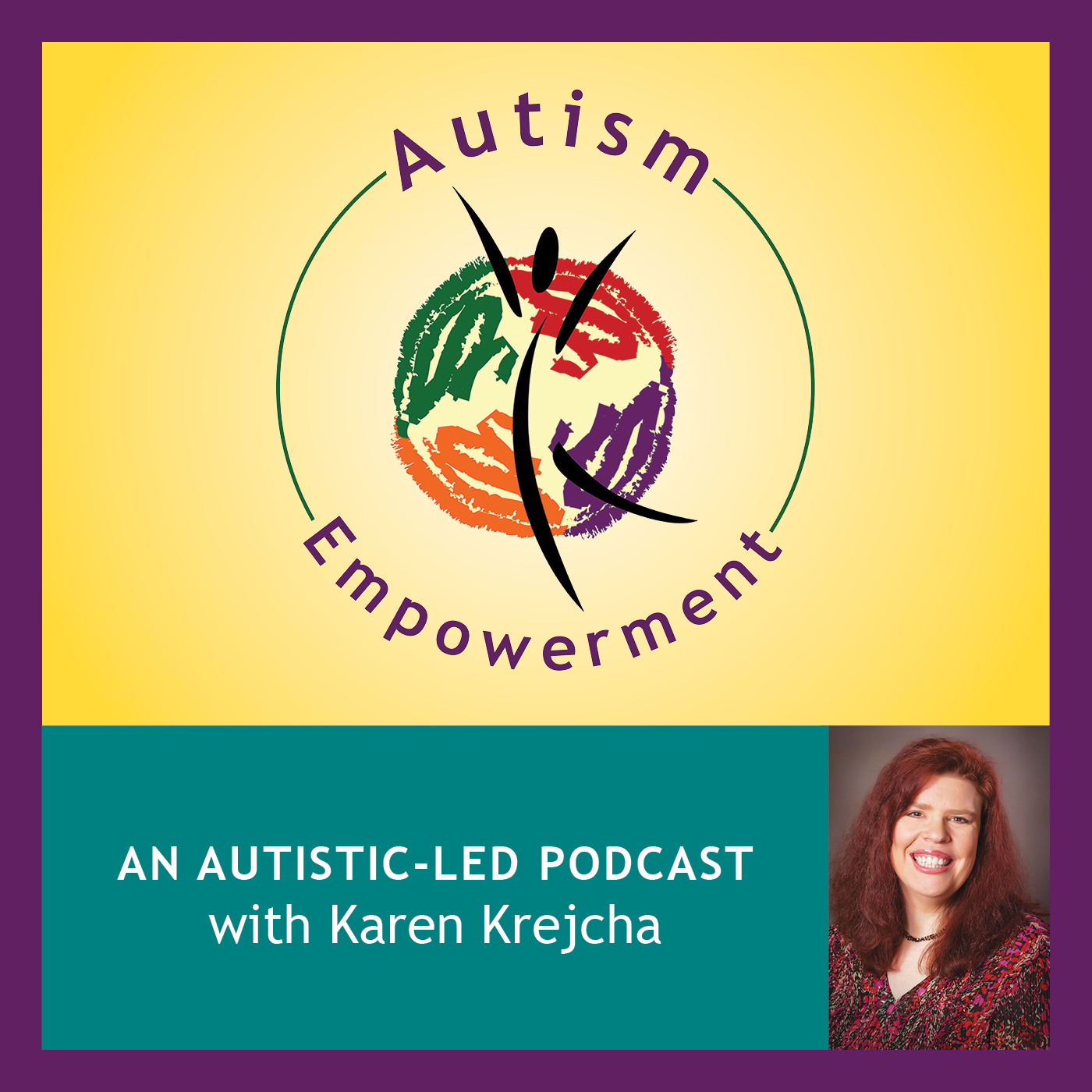Ep. 4: Autism Support Groups - 9 Points to Ponder in the Journey for Connection


In today’s episode, we will be talking about the importance of autism-related support and support groups for autistic adults, youth, parents, and family members. We will also be discussing 9 Points to Ponder in the Journey for Connection, an article from Spectrum Life Magazine.
In today’s episode, we will be talking about the importance of autism-related support and support groups for autistic adults, youth, parents, and family members. We will also be discussing 9 Points to Ponder in the Journey for Connection, an article from Spectrum Life Magazine.
Whether you’re searching for connections with others experiencing a particular challenge, seeking resources and referrals, or are hoping to develop new friendships and relationships, support groups and support forums can reduce isolation and provide great benefits. Join Autism Empowerment Podcast hosts Karen and John Krejcha for this discussion.
Article referenced in this show:
A Spectrum of Support: 9 Points to Ponder in the Journey for Connection by Karen Krejcha, Spectrum Life Magazine Spring 2017
Key points from Episode 04:
(3 minutes, 45 sec)
Question: What is one of the most common challenges reported within autism communities?
Answer: Isolation and a feeling of loneliness and separation.
- Feeling like other people don't get what you're going through.
- People don't relate to your circumstances
- There is nowhere to go where people understand you.
- Could be an autistic youth or adult that feels like they're living in a world that doesn't get them.
- Could be a parent who just had a child diagnosed and can't go to friends because none have kids on the spectrum.
Support groups help people feel less lonely and judged. They can help reduce isolation. We can all benefit from support and community.
(5 minutes, 14 sec)
Question: You once said that the autism spectrum is not one-size-fits-all. What about support groups?
Answer: The spectrum is diverse and we're all unique. Therefore if someone seeks support or therapy, it's not going to be a one-size-fits all treatment. Different support groups and forums are going to appeal to different people. You won't have one support group that is going to be everything to everyone.
(7 min, 43 sec)
Question: How can a person find a support group or forum that is right for them?
Answer: In 2017, I wrote an article called A Spectrum of Support, 9 Points to Ponder in the Journey for Connection. The article was meant as a starting point for a person to really consider what factors are most important to them. Write these things down because they are going to help you assess your current priorities and they are going to help you save time and energy down the road. Once you have your priorities, you can meaningfully continue in your search.
We'll be discussing the 9 points today. Once you have these priorities, our next episode is also going to come in handy. We're going to be talking about questions you can ask yourself or others to vet certain groups or forums. We'll also give you some quick and easy search engine tips to get you where you need to be, strategies to encourage a loved one who seeks support and finally, benefits and pitfalls of different types of groups.
Nine Points to Ponder when thinking about your support group needs.
1) Affiliation
- Affiliated group or casually structured?
- Affiliated - autism nonprofit, health care provider, place of faith, university, government-funded
- Benefits can be an additional educational component or connection to other programs and services.
2) Audience
- General autism support or specific to a topic?
- Autism-only or cross-disability?
- Geared toward a certain age? (pre-K, elementary, middle school, high school, transition, adult?)
- Other family member? Siblings, grandparents, spouse, etc.
- Autistics and non-autistics together learning from one another?
- Moms' or Dad's night out
- Social or respite component
3) Demographics
- Single? Married? With children?
- Working or stay-at-home?
- Students or young adults?
- Millennials, Generation X, Baby Boomers
- Geographic (urban, suburban, rural)
- Faith-based (specific or nondenominational)
- Intersections with other groups? LGBTQ+, BIPOC, Spanish-speaking
- Demographics impact conversation topics.
4) Location
- Convenience and safety
- Parking or near a bus stop?
- In a building, restaurant or someone's home?
- How far are you willing to travel?
- What accommodations are available?
5) Time and Day of Week
- Deal-breaker for in-person groups. More flexible online
- Frequency
6) Cost
- Free or is there a cost to attend?
- Professionally-led or groups with guest speakers may have fees.
- If group is in a restaurant, you may be expected to purchase something.
- Nonprofits often are free to accommodate many people but may have a suggested donation.
- Disability benefits or scholarships may be available.
7) Expectations and Rules
- What are the expectations and rules for a group?
- Taboo topics?
- Fragrance-free?
- Childcare available? Service-animals?
- How is moderation handled?
- Confidentiality or privacy?
- Reach out to group leader in advance to ask about expectations and what happens in a typical meeting
8) Guest Speakers or Pre-planned Topics
- Some groups may have guest speakers and invite you to attend even if you're not a regular member.
- Positive way to learn about a topic but not have to actively participate.
- Some groups are moderated and have pre-planned topics.
9) Attitudes and Beliefs
- Do group leaders, founders and members impart a helpful and positive attitude?
- Support for new members? Additional resources?
- Do members presume competence?
- Are you allowed to engage when you're ready?
- If you need to cry and vent, do you feel you are in a safe place among peers or is it toxic?
- Online groups and forums give you a luxury of lurking, reading past posts and getting a feel for personalities.
- Resourceful and uplifting?
- Are differences in opinions handled respectfully?
- Are autistic voices welcomed and encouraged?
Summary:
There are many benefits in finding a support group that meets your needs but one of the biggest advantages is in realizing you are not alone in your journey.
Ideal groups will promote a feeling of acceptance and empowerment and the opportunity for connection and potential friendships.
The right group will help you feel safe, supported, understood and empowered in your journey, whether you are on the autism spectrum, a parent, a sibling, a caregiver, a spouse or family friend.
Next episode:
- Questions you can ask yourself or others to vet groups/forums
- Search tips to cut through the clutter
- Benefits and pitfalls of different types of groups/forums
- Strategies to encourage a loved one to seek support
If you haven't already done so, please subscribe to our show and leave a 5-star rating if you enjoy our content!
Full Transcript. Click below on words to play.
There may be slight errors due to the way artificial intelligence interprets our voices. We've done some light editing and over time, as technology improves, this will too. We hope this accommodation will be useful to you. Downloads are also available for free.























